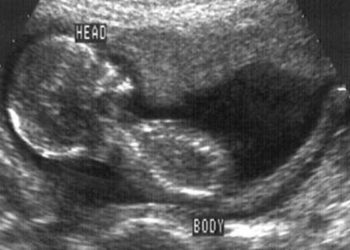#VisualAbstract: Effect of continued folic acid supplementation beyond the first trimester of pregnancy on cognitive performance in the child
1. Folic acid supplementation prevents neural tube deficits during pregnancy, but if continued beyond the recommended first trimester, may positively impact neurodevelopment and cognitive performance in children at seven years of age.
Evidence Rating Level: 2 (Good)
Periconceptional folic acid (FA) supplementation is a protective factor against neural tube defects (NTD), with the recommended time period for this supplementation being limited to the first trimester. This randomized controlled trial of Folic Acid Supplementation during the Second and Third Trimesters (FASSTT) conducted from 2006 to 2007 investigated the potential benefits of FA supplementation during the second and third trimesters of pregnancy on child neurocognitive performance at seven years of age. Mothers were randomly assigned to 400μg/d FA or placebo, starting at 14 weeks’ gestation until pregnancy, with all mothers receiving FA during the first trimester. Children of the participating mothers were evaluated at either age three years (n=39) or seven years (n=70) with the Bayley’s Scale of Infant and Toddler Development (BSITD-III) or Wechsler Preschool and Primary Scale of Intelligence (WPPSI-III), respectively, due to test age requirements and normative data. At seven years, the FA group’s cognitive performance was stronger than the placebo group in word reasoning (mean scaled score [SS] difference 1.4, p=0.027). At three years of age, the FA group outperformed the placebo group in general cognition (mean SS difference 0.8, p=0.040). Compared to a nationally representative sample of British children aged seven years, WPPSI-III scores in the FA group were higher in verbal intelligence quotient (IQ; p<0.001), performance IQ (p=0.035), general language (p=0.002), and full scale IQ (p=0.001). The study placebo group, compared to this national sample, demonstrated significant but smaller differences in WPPSI-III scores for verbal IQ (p-0.034) and full scale IQ (p=0.017). The findings of this study suggest that, beyond prevention of NTD, continued FA supplementation throughout the second and third trimesters may yield positive neurocognitive outcomes in children compared to those who only receive FA during the first trimester.
Click to read the study in BMC Medicine
©2019 2 Minute Medicine, Inc. All rights reserved. No works may be reproduced without expressed written consent from 2 Minute Medicine, Inc. Inquire about licensing here. No article should be construed as medical advice and is not intended as such by the authors or by 2 Minute Medicine, Inc.







